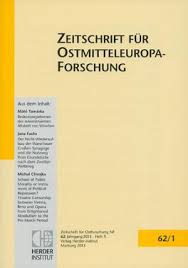Justizwesen und Strafverfolgungsorgane der Zweiten Polnischen Republik im Umgang mit Juden
The Justice System of the Second Polish Republic in Relation to Citizens of Jewish Descent
Author(s): Mateusz RodakSubject(s): Criminal Law, Interwar Period (1920 - 1939), History of Antisemitism
Published by: Verlag Herder-Institut
Keywords: Justice System; Second Polish Republic; Relation to Citizens of Jewish Descent;
Summary/Abstract: The national and denominational makeup of criminal milieus reflected the multiethnic state in the Second Polish Republic. Criminals of Jewish descent constituted about 10 per cent of criminals (statistics for the 1920s are even lower – about 5 per cent). This percentage of course varied depending on region, the level of assimilation, affluence and religiousness. But the situation of Jewish criminals beginning with arrest, investigation, trial and prison sentence deviated from the standards applied to Christian criminals (for the most part Roman Catholics). This article attempts to illustrate the situation of Jews who came into contact with various bodies of the criminal justice system in Poland during the interwar period. At each level of the system, Jewish criminals – both repeat offenders and occasional criminals – were met with discrimination of various forms and various levels of intensity. First and foremost, this treatment was a result of the fact that Jews were rare among the police or prison guard forces and only rarely became judges. The second and related problem was language. As law enforcement personnel did not know Yiddish, this became an obstacle that impeded basic communication between Jews, police and prison guards. A further problem which Jews faced was the structure of Polish law (e.g. restrictions concerning ritual slaughter, prohibition of trade on Sundays), which put Jews at an economic disadvantage and in turn may have led to potentially criminal activities (e.g. businesses needing to be closed on Saturday – as per religious law – and on Sunday (as per state law)). Another difficulty concerned prison regulations, which, with few exceptions, did not accommodate the special needs of prisoners of non-Christian descent. The final and possibly most important issue was the attitudes of employees of the Polish justice system, which ranged from indifference to open anti-Semitism.
Journal: Zeitschrift für Ostmitteleuropa-Forschung
- Issue Year: 62/2013
- Issue No: 2
- Page Range: 187-205
- Page Count: 19
- Language: German

